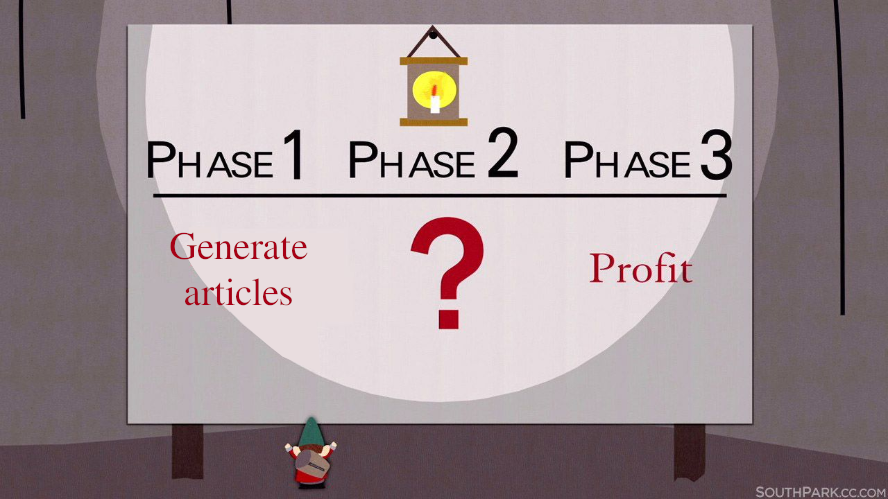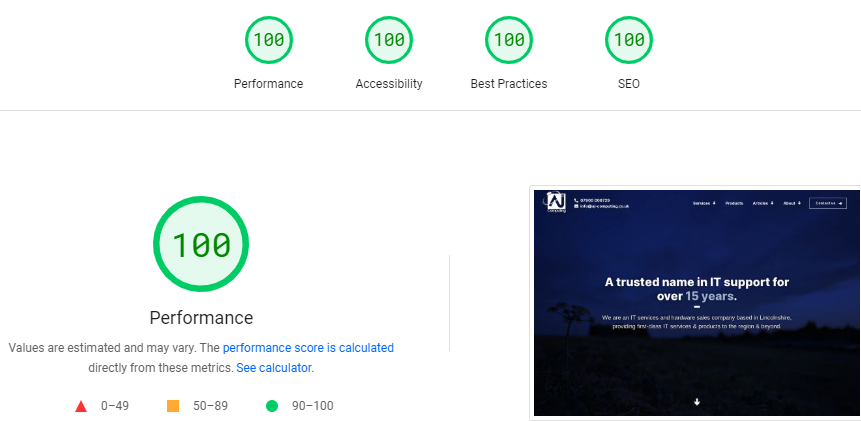ChatGPT-generated articles are probably bad for your website
We don't generate mediocre filler, and we don't think you should either. (February 2023)
We're not good at writing articles. We think the ones we write are great, but we've written about 15 so far, which averages just under one for each year of the existence of this website, and slightly more than one per year since we wrote the first article.
It is common for businesses to be advised that content is king, and minus my irrational hatred for the word "content" I could agree. Our very occasional, when-we-feel-like-it writing of articles might look like poor performance; content as court jester or maybe terminally-indebted Earl of Someplace around these parts.
We have our reasons for that. The smallest of those is laziness; when we aren't writing articles it is rare that we are sitting on a beach sipping pina coladas or on a bench drinking White Lightning. Like any company whose business is not writing articles, one of the constraints is time. Writing good articles requires time that we often do not have. The substitute for putting your own time into something is money, which in this case would mean paying someone to write articles for us, but that (and we will go into this later) is a good way to buy someone else's very mild opinions written blandly.
You can believe our excuses if you like, but the upshot of this is that we don't get to write often, which probably means we don't get as many search engine hits as we could.
A few months ago, a text generating bot called ChatGPT was released. It can write mostly grammatically-correct and sometimes factually-correct articles given a writing prompt.
The obvious question is, then: what if you used ChatGPT to write articles for your site? It costs nothing (for now). It takes minimal time, especially if you automate the automated generation of articles. And having a steady stream of new articles is supposed to be good for your SEO, which means it's good for your business, which means it will make you money.
That has been floated both as a question by a couple of our clients and as a suggestion in the technical communities we hang around in. Our advice is: We don't write automatically-generated articles, and we suggest that you don't do it either. It does not generate good articles, it will probably be bad for your SEO in anything but the shortest term, and it will probably not make you any money.

It might help your SEO - in the very short term
We say this might help your SEO in the short term, because that is a hedge against the fact that nobody knows for sure. Going from a website with skeletal pages to one with some reasonably-fleshed-out pages might help it rank better in search engines. Being continually updated has some marginal chance of being a ranking signal too.
We don't know that for a fact, because nobody who does not work at Google can tell you exactly how its ranking algorithms work, and many of the people who do work at Google can't tell you that either. When deciding how to build pages for your website, it would be best to look at what Google says, and also to look at how it has behaved in the past.
The advice from Google has always been that if you write lots of high-quality pages, you will rank well in search engines. Sometimes, in the short term, this doesn't pay off. In the short term you often gain more from gaming Google's current algorithm than you do for trying your best to write interesting things, and then those shortcuts are cut off. In the meantime, people can make lots of money out of that traffic to their site...but we'll get to that later.
(Sometimes even in the long term low-quality sites persist in search engine rankings. Why e.g. Pinterest maintains outsized influence of search results despite having literally no original content, and ranks despite ample user complaints about its weird dominance of search results, I do not know.)
Just over a decade ago, Google introduced page quality as a ranking signal. This caused a significant traffic drop to websites with lots of low-quality articles. I was involved in one of those websites at the time. Because we had focused on quantity rather than quality in the years before, the all-hands-on-deck project to raise the overall quality of the articles just to un-tank our Google rankings was Herculean and all-consuming.
You can be sure that Google is working on detection of articles written by ChatGPT (and whatever follows it), and so you can be sure that whatever gains are made in SEO (if there are any) will become a liability in the future. Maybe not tomorrow, maybe even not next year. If your business is getting people to read your articles so you can get ad revenue now, then this might not matter, because you might make money in the short term, and that money will not disappear when your search engine rankings implode. If your business is selling goods or services, and your website has articles on it, then you have to balance those (maybe imaginary) short-term gains against whatever efforts will be needed to fix your giant pile of low-quality articles in the future.
It does not write good articles
Much is made of ChatGPT's factual accuracy, or lack of such. You should care about misleading your website's visitors, and it is unwise to rely on text generated by it. I would rate the verity of ChatGPT's text roughly the same way and with the same words I would rate most of the journalists who have written about ChatGPT: It is often quite good at stating facts. It likes stating facts so much that it occasionally invents brand new facts to state, disregarding any correspondence of them to reality. If opinions leak into the text, they do so by accident and they are usually unadventurous.
No, ChatGPT's articles are bad because they are boring. ChatGPT is trained on a vast variety of texts, as a blender can be trained on a wide variety of food. ChatGPT text has no style, no hint of a voice, and no sense of humour. it feels like the average of all writing styles, as the result of a blender is the average of its inputs. It is not special and it is not personal; it will write with the same bland voice as everyone else using ChatGPT to generate articles.
Even a regurgitation of facts can be interesting, if it is written well. But ChatGPT is - for now - incapable of the latter.
Using ChatGPT isn't as novel as you think
Of course, the idea of machines inventing text is relatively new, and machines actually doing so has only reached mass consciousness in the last few months. But its application here is a new tool applied to a bad solution to the wrong problem: you want articles, regardless of quality, so crank out as many of them as you can as cheaply as possible and with the least amount of effort.
I hinted at this earlier when I mentioned that Google introduced rankings based on quality, and of the panic it caused when it was first introduced. That was over a decade ago. It was possible to crank out vast amounts of articles regardless of quality back then, by simply paying humans small amounts of money to write them. It is every bit as easy to do that now, and most major websites already do it. A search on, e.g. Fiverr will bring up many people who will write SEO articles for £10 or less. We could pay for one of those per day by buying slightly fewer biscuits. If we did that at the start of AJ Computing we'd have over 6500 articles by now!
(And yes, ChatGPT is definitely going to make cranking out mediocre articles for a living a bad business to be in. This was a business model that was crying out to be automated anyway, and I only partly say that out of spite fuelled by distaste for low-quality filler.)
We never bought cheap articles because we care about quality. We care that it is us speaking in our voice, about the things we like and the opinions we have. We play the long game of doing the right thing at expense of short-term gain. The payoff might not be immediate, but we sleep well with a clear conscience.
Now what?
Those, then, are the reasons we don't use ChatGPT. But what, then, for the small-to-medium business that feels they need something on their site? How do you find the time and the inclination to write?
First, it's OK. Sometimes you will be able to write things and sometimes you won't. The things that make you money should take priority, because money is why you are in business. Things that do not make money can be neglected. And let's be clear: it is not clear that there really is a write-articles-to-making-money pipeline.

I do think there is value in writing for your website. But I understand any business owner who would prioritise immediately-money-making things above writing for their website. Where there is value, it is because it is fully you writing. When we write here, we do so never because we are expecting a return on time invested. We do it because we like it. If you just don't like writing, it's fine to not write!
Secondly, you probably have more to write about than you think. This article came about as a consequence of a ten-minute telephone conversation between me and the AJ Computing founder - and that conversation ended with "I think there's an article in here somewhere...". The ideas were scribbled down, and then I wrote this whenever I had a bit of free time in the next few weeks. Other times, we've found ourselves saying the same thing to a lot of our clients; we wrote that down in part to crystallise our own thoughts.
Thirdly, stop diverting time into social media. If the "articles-on-website-to-money" exchange rate is unclear, there is even less evidence for most businesses that keeping up some kind of regular posting on social media websites is worth the time invested. And if you post the same thoughts on your own website, at least that is in your venue and on your terms. The amount of time freed up by not posting on social media that is probably larger than you think; my anecdata is watching people returning to serious, long-form writing after the apparent implosion of Twitter.
And finally, rolling out the biggest of all the cliches, be yourself. If you don't like writing on a topic, don't write on it, because a reader can tell that you aren't interested. If you are interested in something, even if you think it is boring and niche to anyone else, write about it. Share your unique expertise, and build trust with the reader by writing in your voice about the things you care about.


